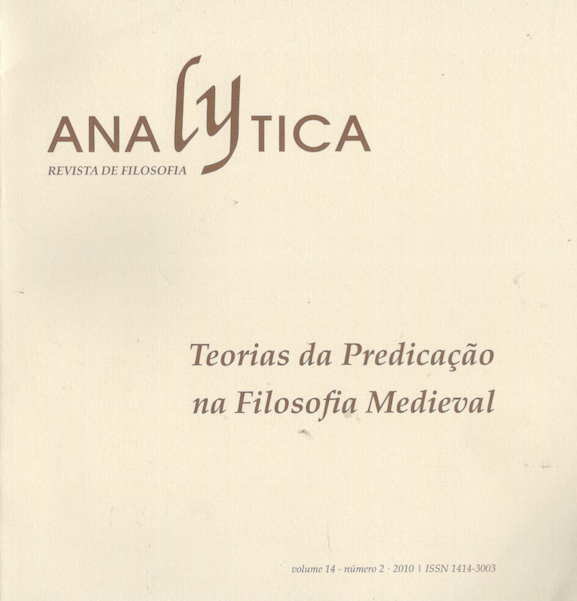Univocidade e predicação no século XIV: João Duns Scotus e Pedro Thomae
Resumo
Meu objetivo nesse texto consiste em explorar uma consequência da compreensão defendida por João Duns Scotus acerca da noção de ente. É bem conhecido que Scotus constrói aquela noção como um conceito unívoco, que se aplica a todos os sujeitos a que se aplica de acordo com o mesmo conteúdo (ratio). Essa teoria, no entanto, possui preocupantes consequências se atentamos para o fato de que, sobre um tal base, deveríamos aceitar que a noção de ente é um predicado essencial tanto de gêneros quanto de diferenças. Essa situação leva, a saber, ao problema da reiterada repetição do mesmo tempo, isto é, ao problema da gagueira sintática, quando da construção de definições mais detalhadas de espécies. Explorarei inicialmente a solução que Scotus oferece ao problema, assim como alguns aspectos de sua recepção no século XIV. Concentrar-me-ei em seguida na solução alternativa esboçada por Pedro Thomae à mesma questão. Espero com essa investigação contribuir para o esclarecimento dos méritos e das dúvidas que pairam sobre a teoria da univocidade do ser.
Abstract
My aim in this paper is to explore a consequence of the account offered by John Duns Scotus of the notion of being. It is well know that Scotus constructs such notion as a univocal concept, which applies to all subjects it applies to according to the same content (ratio). This theory, however, has disturbing consequences if we take into account that in such a basis we should accept that to both genus and differences the notion of being is an essential predicate. This amounts namely to the problem of the reiterate repetition of the same term, i.e., to the problem of syntactic stuttering, when constructing more detailed definition of species. I will explore firstly the solution Scotus proposes to the problem, as well as some aspects of its reception in the 14th century. Then I will focus on the alternative solution sketched by Peter Thomae to the same question. I hope this investigation will contribute to clarify the merits and doubts that hover over the theory of the univocity of being.
Downloads
Downloads
Publicado
Como Citar
Edição
Seção
Licença
Os autores que publicam nesta revista concordam com os seguintes termos:
- Os autores mantêm os direitos autorais e concedem à revista o direito de primeira publicação, com o trabalho simultaneamente licenciado sob a Licença Creative Commons Atribuição-SemDerivações 4.0 Internacional (CC BY-ND 4.0), que permite a redistribuição, comercial ou não comercial, desde que a obra original não seja modificada e que seja atribuído o crédito ao autor.
- Os autores têm autorização para assumir contratos adicionais separadamente para distribuição não-exclusiva da versão do trabalho publicada nesta revista (ex.: publicar em repositório institucional ou como capítulo de livro), com reconhecimento de autoria e publicação inicial nesta revista.
- Os autores têm permissão e são estimulados a publicar e distribuir seu trabalho online (ex.: em repositórios institucionais ou na sua página pessoal) a qualquer ponto antes ou durante o processo editorial, já que isso pode gerar alterações produtivas, bem como aumentar o impacto e a citação do trabalho publicado (Veja O Efeito do Acesso Livre).


